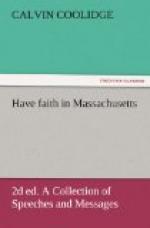Such an education considered from the position of society does not come from science. That provides power alone, but not direction. Give a savage tribe firearms and a distillery, and their members will exterminate each other. They have science all right, but misuse it. They lack ideals. These young men that we welcome back with so much pride did not go forth to demonstrate their faith in science. They did not offer their lives because of their belief in any rule of mathematics or any principle of physics or chemistry. The laws of the natural world would be unaffected by their defeat or victory. No; they were defending their ideals, and those ideals came from the classics.
This is preeminently true of the culture of Greece and Rome. Patriotism with them was predominant. Their heroes were those who sacrificed themselves for their country, from the three hundred at Thermopylae to Horatius at the bridge. Their poets sang of the glory of dying for one’s native land. The orations of Demosthenes and Cicero are pitched in the same high strain. The philosophy of Plato and Aristotle and the Greek and Latin classics were the foundation of the Renaissance. The revival of learning was the revival of Athens and Sparta and of the Imperial City. Modern science is their product. To be included with the classics are modern history and literature, the philosophers, the orators, the statesmen, and poets,—Milton and Shakespeare, Lowell and Whittier,—the Farewell Address, the Reply to Hayne, the Speech at Gettysburg,—it is all these and more that I mean by the classics. They give not only power to the intellect, but direct its course of action.
The classic of all classics is the Bible.
I do not underestimate schools of science and technical arts. They have a high and noble calling in ministering to mankind. They are important and necessary. I am pointing out that in my opinion they do not provide a civilization that can stand without the support of the ideals that come from the classics.
The conclusion to be derived from this position is that a vocational or technical education is not enough. We must have every American citizen well grounded in the classical ideals. Such an education will not unfit him for the work of the world. Did those men in the trenches fight any less valiantly, did they shrink any more from the hardships of war, when a liberal culture had given a broader vision of what the great conflict meant? The discontent in modern industry is the result of a too narrow outlook. A more liberal culture will reveal the importance and nobility of the work of the world, whether in war or peace. It is far from enough to teach our citizens a vocation. Our industrial system will break down unless it is humanized. There is greater need for a liberal culture that will develop the whole man in the whole body of our citizenship. The day when a college education will be the portion of all may not be so far distant as it seems.




